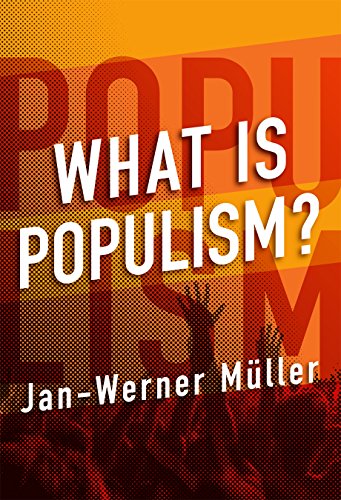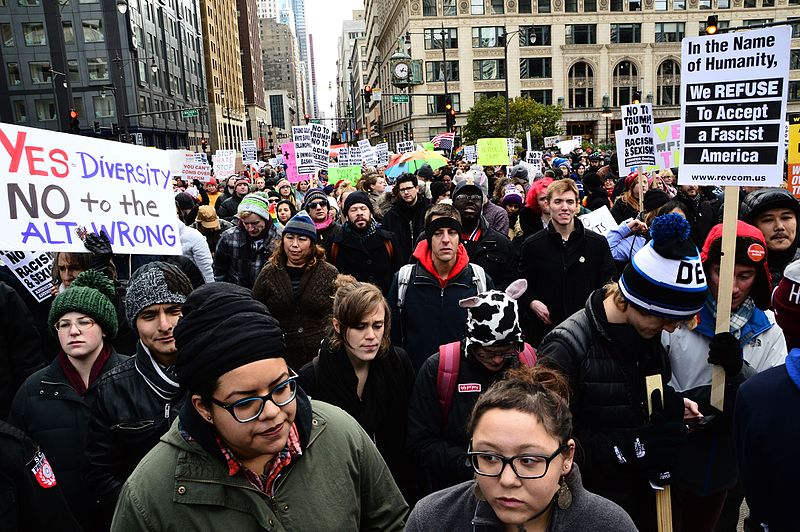Book review: What is Populism? By Jan-Werner Müller
University of Pennsylvania Press, August 22, 2016. 136 pages.
From Brexit, the referendum that kicked the UK out of the EU, to Trump’s election predicated on “draining the swamp” in Washington and making “America Great Again”, the sudden rise of populist nationalism shook the US and Europe in 2016. With Trump in the driving seat, what will 2017 hold? Should we worry?
A new book “What is Populism?” by Jan-Werner Müller, a noted German political scientist, brings much needed answers. It provides an elegant explanation of a phenomenon of our times, populism, that threatens to upend the post-World War II global order as we know it.
(e-book available on Amazon , approx. $10)
Who is the Author and Why should we Pay Attention to What He Says?
Professor Jan-Werner Müller, born in 1970, comes with impressive credentials: he studied at the Berlin Free University; London University College; Oxford St. Antony’s College and Princeton University. He was a Fellow of All Souls College, Oxford (1996-2003) and a Fellow in Modern European Thought at the European Studies Centre, St. Antony’s College (2003-2005). Since then he has been teaching in the Politics Department, Princeton University where he currently directs the Project in the History of Political Thought at the University Center for Human Values.
Professor Müller is a co-founder of the European College of Liberal Arts (ECLA) in Berlin, Germany’s first private, English-speaking liberal arts college. He regularly contributes to all the major German newspapers and in English to the UK Guardian, the London Review of Books, Foreign Affairs, Project Syndicate, Dissent, the Boston Review, and Prospect. He has published eight books so far, starting in 2000 with ‘Another Country: German Intellectuals, Unification and National Identity’ (by Yale University Press; Chinese translation).
In the photo: Jan-Werner Müller at a conference Photo credit: Wikimedia Commons
“What is Populism?” was first published in Germany in April 2016 (by Surhkamp) and brought out in English (by University of Pennsylvania Press) last August with some modifications to adapt it to an American audience; but the interesting analysis of Hungary’s dramatic slide into autocracy under populist strongman Viktor Orban has remained intact. Considering Orban’s style of government (for example, in his recent “State of Hungary” speech on 10 February, he violently attacked the billionaire philanthropist George Soros, see Fox News report here) and his plan to run for re-election in 2018, that section of Muller’s book is highly relevant.
The book is short, some 130 pages, consisting of just three chapters, an easy read, made all the easier that the conclusion consists of “Seven Theses on Populism” that neatly summarize the whole book. It has drawn attention in academic circles and sells well on Amazon (ranked #11 in the category “comparative politics” at the time of writing).
What Exactly is “Populism” and Why should we Worry?
As Müller notes in his introduction, “no US election in living memory has seen as many invocations of ‘populism’ as the one unfolding in 2015-16”. And the same can be said now of the coming elections in Europe, in some key EU member countries: France, the Netherlands, Germany and Italy (though elections in the latter may be postponed to next year).
In all these countries, populist parties are on the rise and all uniformly promise to bring down the “established order”: down with the Euro and the European Union, up with borders, each country onto itself. Just listen to the front-running candidate for the French Presidency, Marine Le Pen of the Front National, it’s an eye-opener. Here is what she said on February 5 when she launched her campaign in Lyon, unveiling a 144-point program calling for leaving the euro-zone, holding a referendum on European Union membership, and limiting immigration:
Globalization is my enemy, one in the name of global finance and one in the name of radical Islam […] They will lead to the disappearance of this France, as we remember it and as we love it. One advances under the guise of liberal economics, the other under the guise of religious liberty.
Perhaps what is most bizarre about populism is that it can arise on the right as well as on the left. The label applies equally to Donald Trump and Bernie Sanders. And, as Müller writes, it is “primarily associated with particular moods and emotions: populists are ‘angry’; their voters are ‘frustrated’ or suffer from ‘resentment.’”
IN THE PHOTO: Anger at a Trump rally in Chicago 22 October 2016 Photo Credit: Justice via Wikimedia Commons
Beyond that, Müller notes, we haven’t had a convincing “theory of populism”, there is no “coherent criteria” for deciding when politicians turn populists. And this is where his definition comes in, setting out exactly what makes for a populist and how he (or she) is different from the run-of-the-mill politician in a democracy.
After all, any politician in the opposition will attack the establishment. It is in the DNA of the opposition. And all politicians try to appeal to their voters and do this in emotional terms (if they can). They know emotions will move voters.
Could populism be “the authentic voice of democracy” as the American cultural historian Christopher Lasch maintained?
Müller begs to disagree. He puts forward deceptively simple and strikingly logical criteria that set a populist apart from a regular politician:
- First, “it is a necessary but not sufficient condition to be critical of elites in order to count as a populist”;
- Second, “in addition to being anti-elitist, populists are always Populist claim that they, and they alone, represent the people.” This claim is hugely important, it really is what sets them apart. Populists always take the higher moral ground. Populists are politicians that “refuse to recognize any opposition as legitimate”.
Or, as Professor Müller strikingly sums up:
“Put simply, populists do not claim ‘We are the 99 percent’. What they imply instead is ‘We are the 100 percent’. For the populists, this equation always works out: any remainder can be dismissed as immoral and not properly part of the people at all.”
Which is another way of saying, as Müller points out, that “populism is always a form of identity politics” – and this is why populism is a threat to democracy: Because “democracy requires pluralism and the recognition that we need to find fair terms of living together as free, equal but also irreducibly diverse citizens.”
Related article: “#ICANTKEEPQUIET“
There is no such thing as a “single, homogeneous, authentic people”, it is a fantasy, and, Müller reminds us, a dangerous one “because populists do not just thrive on conflict and encourage polarization; they also treat their political opponents as ‘enemies of the people’ and seek to exclude them altogether.”
He also reminds us that we should not be too complacent: There is a dangerous notion floating about that populists, once they win an election, cannot govern because, by definition, “one cannot protest against oneself in government”. This is naïve, populists do govern and Müller explains how.
What Populist Governments Do
They exhibit three features:
- attempts to hijack the state apparatus;
- corruption;
- “mass clientelism”, defined as “trading material benefits or bureaucratic favors for political support by citizens who become populists’ ‘clients’.”
In all cases, populists justify themselves by saying they are doing this “for the people”.
That is why revelations of corruption or the destruction of constitutional freedoms rarely backfire politically. There is no damage done to the reputation of populist leaders because their fans see them as “one of us, doing it for us” and will forgive them any shortcoming.
As Müller shows in his second chapter, populists go so far as to rewrite constitutions to their own benefit and to ensure the permanence of their power, as shown by the example of Chavez in Venezuela, Orban in Hungary (and more recently, Erdogan in Turkey, though his example, no doubt because it is so recent, is not analyzed in the book). The very purpose of democratic constitutions is subverted: instead of preserving pluralism and the freedom of every citizen, it eliminates them.
In his third chapter, Müller addresses both the deeper causes of the current wave of populism – the 2008 Great Recession, the threat of globalization and international trade, the discontent of the middle classes in developed countries who feel threatened by immigrants – and how to respond to populist politicians and their voters.
How to Respond to Populism
This is perhaps the most important question and here Müller’s book fails to give a full answer. He does make the important point that we should neither exclude populists from debate (that is what they want) nor adopt a “paternalistic liberal attitude that effectively prescribes therapy for citizens ‘whose fears and anger have to be taken seriously,’” or for that matter, go to the other extreme of adopting populist proposals as one’s own.
So what does he propose we do? His starting point is that we should realize and take for a given that the greatest danger to democracy is not “some comprehensive ideology that denies democratic ideals”: Most autocratic governments try hard to be recognized by international organizations (the UN) and Western elites as “genuine democracies” – even China.
The real danger, argues Müller, comes from within the democratic world: It is populism, a “degraded form of democracy that promises to make good on democracy’s highest ideals (‘Let the people rule!’)” and this results in a form of politics that is “blatantly antidemocratic.”
Fine. But then, how do we address it beyond recognizing it for what it is?
Müller suggests that:
- the debate about “inclusiveness” – i.e. who is part of the “people” and who is not – cannot be a closed debate as the populists imply and want; it should always remain an open debate;
- since pluralism and diversity “are not first-order values as is, for example, freedom,” we need to be “much more precise about what’s wrong with antipluralism”: It amounts to a denial of diversity and of the “status of certain citizens as free and equal”; what everyone needs to do in a pluralistic democracy is accept that these citizens may be “irreducibly different in their identities and interests,” yet they are part of the “people,” they are full citizens;
- To “erect a cordon sanitaire around populists” and refuse to engage in any debate is a bad idea; as long as populists remain “within the law – and don’t incite violence”, it is legitimate to talk to them, but it should not be the “same as talking like populists”; one should not take their arguments at face value or accept the way they frame problems: “proper arguments and evidence can make a difference.”
IN THE PHOTO: Trump protest, Federal Plaza to Trump tower, Chicago, November 19 2016 PHOTO CREDIT: By Ben Alexander via Wikimedia Commons
How Effective is Müller’s Advice Likely to Be?
His arguments, while beautifully laid out, leave one somewhat unconvinced. They seem a little too abstract to have much bite. Maybe “proper arguments and evidence” can win the day against populism and many politicians try to do just that. For example, it has just been announced that Senator Elizabeth Warren has clinched a deal for her coming book called “This Fight is Our Fight: The Battle to Save America’s Middle Class”; this is going to be a book that clearly addresses one of Trump’s main arguments, the disenfranchised middle class that has lost both jobs and status to globalization.
But surely there are other ways to fight populism?
Two strategies come to mind.
One, inspired by the Women’s March on Washington on 21 January, a crowd that was three times as large as the Inaugural one: Surely a “show of force” could bring the message that populists do not have the “whole people” in their hands. And it can be done without violence but with determination and dignity, Gandhi-style:
IN THE PHOTO: The Women’s March on Washington, 21 January 2017 PHOTO CREDIT: By Mobilus In Mobili via Wikimedia Commons
The other strategy calls for a savvy use of social media and digital communications. One can only regret that Müller’s book does not address the peculiarities of politics in the digital age. Not a word about the Internet, the surge of fakes news on Facebook and Twitter, or the alarming way in which information travels at the speed of light, amplifying the smallest quirk and wildest idea, giving the same weight to sense and nonsense, bombarding the audience to exhaustion, causing many people to turn away from traditional sources of information (i.e. the mainstream media).
Such developments are worrisome and inevitably shape the political discourse. And populists (so far) seem to have been particularly adept at taking advantage of our brave new digital world – admittedly, some populists have also been very quick at realizing the danger and turning off social media in their country when the messages circulating on them were not to their liking. This was the case most recently in Turkey with Erdogan who strengthened his grip on power after last summer’s coup, and most autocratic regimes in the world do this regularly – China famously lives behind a “Great Firewall.”
Fortunately, the digital world does provide opportunities to fight populism. Satire is probably one of the most effective ways to go about it and unfortunately it is not mentioned in Müller’s book. People love to laugh, laughter is bi-partisan. And while Facebook and Twitter are afflicted with the “echo chamber” syndrome – whereby people only share news with their friends, thus polarizing the debate – the situation is very different on another platform, possibly the largest of them all: YouTube.
Here, on YouTube, there are no polarizing “echo chambers”, one can hop from one video to the next. Satire can travel freely. And it does. The latest example: following Trump’s inaugural speech – a populist tirade if there ever was any, and, as noted by Müller on the UK Guardian, one in which Trump’s use of the term “the people” was indeed a “warning sign” – a group of video writers in the Netherlands picked on his “America First” slogan and ripped it apart in a hilarious satire, ceremoniously asking Trump to agree that if America came first, the Netherlands should be second.
That video satire was so successful that it went viral, collecting over 20 million viewers and it stimulated an astonishing number of copiers from other countries, all vying to come “second” after America. Over 70 million people viewed them around the world – all these videos were collected on one site on YouTube and can be seen here, starting with the Netherlands one, the “grandfather” of them all:
Satire is a healthy way to inject sanity and a sense of perspective in any political debate – and it is a sign that democracy is alive and well. While the world is reacting with satire to Trump, the same is happening inside America.
Here are some recent examples I just noted:
- in the New Yorker, with humorist Andy Borowitz reporting that “Trump Says He Has Been Treated Very Unfairly by People Who Wrote the Constitution” and that he “talked to Putin and he said their constitution never gives him problems”;
- in the New York Times, with Nicholas Kristof organizing a Donald Trump Poetry Contest to “reject Trump the Perverse”, and poets waged “a battle in verse” that gave some delightful results;
- in The Atlantic, an article entitled “How to Build an Autocracy” suggesting the playbook Trump might use to grab power: it is a chilling vision of the end of democracy in America, so realistic that it is hard to shake off.
Although America has strong democratic institutions based on a system of checks and balances that works, we all need to ask ourselves the question raised in The Atlantic piece:
“Yet the American system is also perforated by vulnerabilities no less dangerous for being so familiar. Supreme among those vulnerabilities is reliance on the personal qualities of the man or woman who wields the awesome powers of the presidency. A British prime minister can lose power in minutes if he or she forfeits the confidence of the majority in Parliament. The president of the United States, on the other hand, is restrained first and foremost by his own ethics and public spirit. What happens if somebody comes to the high office lacking those qualities?”
Indeed, what will happen with Trump, given his personality and authoritarian tendencies? What will be the impact on the world’s strongest democracy?
Recommended reading: “CULTS, THOUGHT REFORM, AND POPULISM: AN INTERVIEW WITH CULT TRACKER RICK ROSS”













